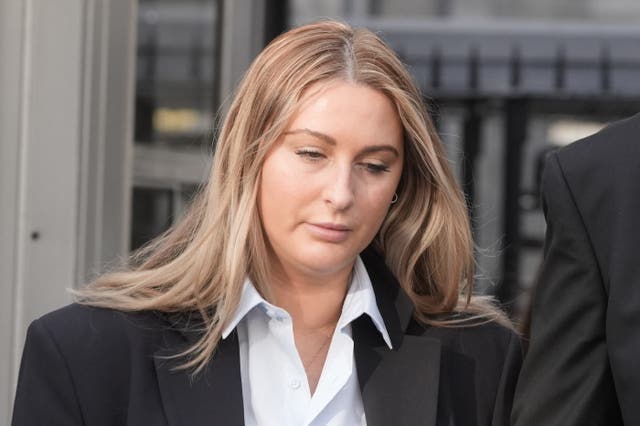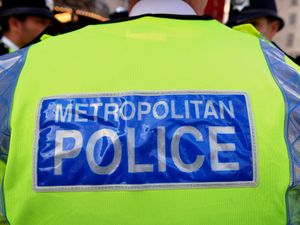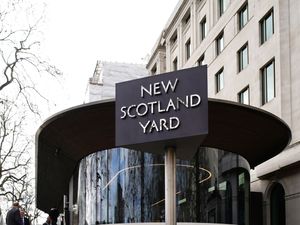Conor McGregor rape accuser ‘suffered serious injuries’, court told
Nikita Hand is claiming civil damages against mixed martial arts fighter McGregor and another man.

A woman who claims she was raped by Irish mixed martial arts fighter Conor McGregor suffered serious physical and psychological injuries as a result of the alleged attack, a court in Dublin has heard.
Nikita Hand, who is claiming civil damages against McGregor and another man, was diagnosed with post-traumatic stress disorder (PTSD) following the alleged incident in December 2018.
A paramedic told the High Court in Dublin that she had not seen “someone so bruised” in a long time when she examined Ms Hand the day after she was allegedly sexually assaulted.
Advanced paramedic Eithne Scully said that Ms Hand was “very upset and distressed” and wanted to “curl up” when she spoke to her.

Mr McGregor is facing an accusation in the civil action that he “brutally raped and battered” Ms Hand, who is also known as Nikita Ni Laimhin.
She is also suing another man, James Lawrence, for sexual assault on December 9 2018.
Ms Hand, who has no automatic right to anonymity, has accused Mr McGregor of pinning her to a bed and raping her in a hotel bedroom in south Dublin.
The court previously heard that Ms Hand was picked up by Mr McGregor and her friend after a work Christmas party on December 8, and taken to a penthouse suite in a south Dublin hotel.
On Tuesday, Ms Scully said she and another paramedic, Neil Dempsey, took Ms Hand to the Rotunda hospital sexual assault unit in an ambulance.
Footage of Ms Hand in the back of the ambulance was played to the court.
Ms Scully said that Ms Hand’s main concern was that a tampon had been “pushed up way too far”, and she had pains.
In evidence to the court, Ms Scully said she could see a small cut on her chin and there appeared to be some bruising on her lower neck.
During an examination, she saw bruising around her chest, breast, down her legs, as well as around her buttocks and thighs.
When asked about the severity of the bruising, Ms Scully told the court that she had not seen someone so bruised in a long time.

The court also heard from Ms Hand’s doctor, Dr Frank Clarke, who said she had been diagnosed with PTSD and has attended counselling in the weeks after the alleged incident.
He said he has been treating Ms Hand since she was a child, and that she had a history of anxiety and struggled with her confidence – and had previously been prescribed a low dose of medication to help her.
He said that following her diagnosis of PTSD, she had been prescribed stronger medication, which he said helped her deal with the peaks of her emotional pain.
Dr Clarke said the medication has a sedative effect, and helps people who suffer from night terrors, panic attacks and severe distress.
He said said they are only used in the short term as they can be abused.
Ms Hand was prescribed a number of the tablets, which helped with her sleep, anxiety and emotional distress – but he said it was “not a good route to go”.
“In general we are strongly against using those on an ongoing basis,” he added.
Dr Clarke said that Ms Hand has struggled over the years because of her PTSD, and has struggled with her self-esteem.
He said that symptoms of PTSD includes a person losing hope, hating themselves, drinking too much, and behaving in a way that is uncharacteristic.
He said that Ms Hand has received ongoing counselling and medication to help her with her condition.
He also said Ms Hand was anxious not to become dependent on medication and had remained determined to continue using counselling as a form of treatment.
The court was told that PTSD is caused by an “extremely stressful or terrifying event”.
The person can either be part of the event or witness it.
The court was told that Ms Hand has suffered from flashbacks, nightmares, severe anxiety, and intrusive thoughts.
Dr Clarke said that she has visited his practice in recent times, sometimes alone and sometimes with her mother and that they have been trying to support each other, but have been struggling to cope.
He said Ms Hand had to leave her work as a hairdresser because the alleged event happened following a Christmas work party, that people in her work knew about it and people coming into the salon had been talking about it.
The GP said Ms Hand had great difficulty coping, and that the relationship with her former partner broke down and she had difficulty in supporting her mother.
He also said Ms Hand has found it difficult to undergo routine health procedures, including a smear test.
He said that it has been “incredibly difficult” for his patient, and he hopes she can continue with check-ups soon.
Ms Hand was examined by psychiatrist Dr Ann Leader, who specialises in treating people who are alleged victims of sexual abuse.
Dr Leader, who has almost 50 years of psychiatry experience, has dealt with around 5,000 cases throughout her career.
Dr Leader told the court that Ms Hand was suffering from nightmares, was detached from friends, felt that she was losing control of her life and felt she was not there for her daughter or partner.
Asked about her mental state at the time, Dr Leader said of Ms Hand: “She was anxious, she was tearful and in my opinion she came across as somebody who was traumatised.”
Earlier, Mr Justice Alexander Owens told the court it emerged in recent days that someone watching the case proceedings on a remote feed had taken a photograph or screenshot of the hearing.
Judge Owens said he takes a “dim view” of the incident, adding that it is a breach of data and contempt of court.
The matter, which is now under investigation, was flagged to the court by a journalist.
The case continues.





